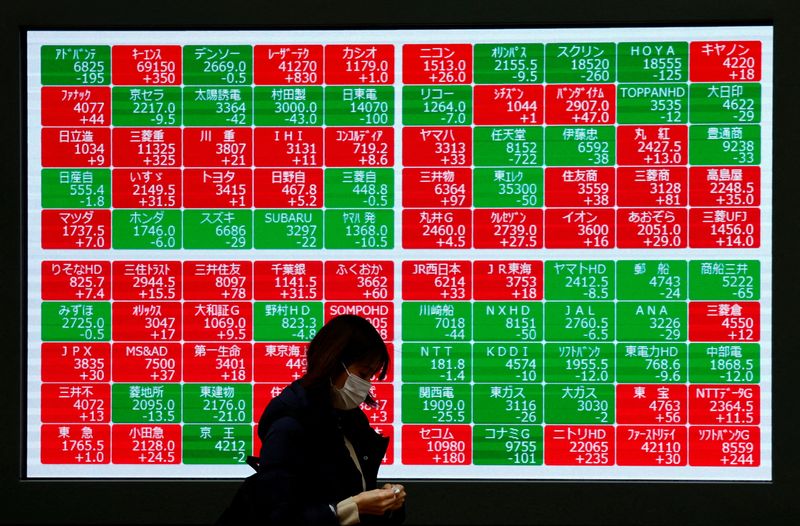By Jamie McGeever
(Reuters) - A look at the day ahead in Asian markets.
A remarkably light economic data and events calendar in Asia on Thursday will allow investors to chew over the rise in U.S. and global bond yields that appears to be gathering pace, strengthening the dollar and tightening financial conditions.
Unsurprisingly, risk appetite is suffering.
The MSCI World equity index fell 1% on Wednesday and the MSCI Asia ex-Japan index slumped 1.6%, its biggest fall in six weeks. Hopes of a rebound on Thursday will have been tempered by Wall Street's slide deep into the red too.
Thursday's regional calendar offers few major market-moving signals. Reserve Bank of Australia's deputy governor Sarah Hunter is scheduled to speak, Australian home building approvals data will be released and Taiwan revises first quarter GDP.
Friday's calendar, by contrast, is packed with top-tier releases including Chinese PMIs, Tokyo inflation and India's Q4 GDP, all of which precedes the main event of the week - U.S. PCE inflation for April.
Investors have to navigate Thursday first though, and market waters are getting increasingly choppy.
The 10-year Japanese Government Bond yield is now at 1.075%, the highest since late 2011 and up eight days out of the last nine.
But these juicier yields aren't doing much for the yen, which is sliding closer to 158.00 per dollar, where Japanese authorities are suspected to have intervened on May 1 selling dollars to support the domestic currency.
Global yields, already significantly higher than Japan's, are also rising. The 10-year U.S. Treasury yield jumped another seven basis points on Wednesday to 4.64%, the highest in a month, and the two-year yield briefly topped 5.00% again.
U.S. yield spreads over other jurisdictions may not be widening much in the dollar's favor, but they are staying wide enough to ensure the dollar remains investors' currency of choice.
The dollar index rose 0.5% on Wednesday, its biggest rise in a month.
China bulls, meanwhile, might have been encouraged by the International Monetary Fund's assessment on Wednesday of Asia's largest economy. The IMF upgraded its 2024 and 2025 GDP growth outlooks by 0.4 percentage points to 5% and 4.5%, respectively.
But the IMF was more cautious on the longer term outlook, warning that growth could slow to 3.3% by 2029 due to an aging population and slower expansion in productivity.
More immediately, the economy's strong performance in Q1 might have set the bar of expectations too high - China's economic surprises index continues to fall and is now on the brink of turning negative.
If China's economic surprises index is grinding lower, however, Japan's has fallen off a cliff. At the start of May it was +35.2, and on Wednesday it was -36.8, the lowest since January last year.
Here are key developments that could provide more direction to markets on Thursday:
- RBA deputy governor Sarah Hunter speaks

- Australia home building approvals (April)
- Taiwan GDP (Q1, revised estimate)